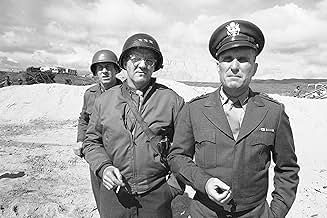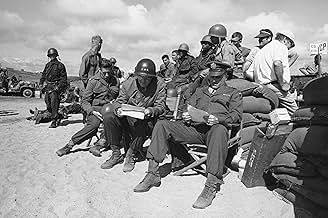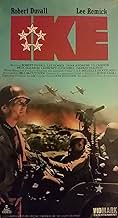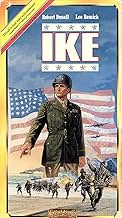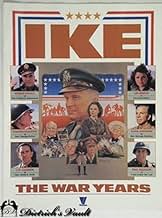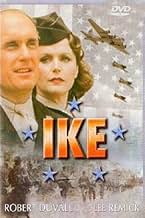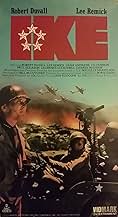During World War II, General Dwight D. "Ike" Eisenhower serves as supreme commander of the Allied Expeditionary Force in Western Europe. On a personal level, he has an extramarital affair wi... Read allDuring World War II, General Dwight D. "Ike" Eisenhower serves as supreme commander of the Allied Expeditionary Force in Western Europe. On a personal level, he has an extramarital affair with his driver Kay Summersby.During World War II, General Dwight D. "Ike" Eisenhower serves as supreme commander of the Allied Expeditionary Force in Western Europe. On a personal level, he has an extramarital affair with his driver Kay Summersby.
- Nominated for 5 Primetime Emmys
- 1 win & 5 nominations total
Browse episodes
Featured reviews
After haveing studied General/President Eisenhower for sometime in several venues, all I can say is that Robert DuVall played the part just right. During 4 hours of this film, Robert DuVall was Eisenhower.
I wish this title was available in some video format today, it is a tremendous look at the history of the ERA. The viewer must cut through the love story of Kay Summersby and Ike. Based on all accounts of those who were there, this was a completely one sided love affair. While Ike depended on Kay in many ways, there was no affair on his part.
Once past that, the history is right on point.
I wish this title was available in some video format today, it is a tremendous look at the history of the ERA. The viewer must cut through the love story of Kay Summersby and Ike. Based on all accounts of those who were there, this was a completely one sided love affair. While Ike depended on Kay in many ways, there was no affair on his part.
Once past that, the history is right on point.
Someone said that this film is much ado about nothing. They said that it spends an entire miniseries debating an absurdly narrow historical question. Did General Eisenhower have an affair with his English driver Kay Summersby? Harry Truman, who never liked Eisenhower, said that he wrote to General George C. Marshall and asked permission to divorce Mamie so he could marry this woman. Truman said Marshall wrote such a blistering response that he abandoned the idea. Truman said he destroyed the letter so it cannot be proven today. This aside, Robert Duvall is an amazing actor who really brings Eisenhower to life. He shows his humanity and his decency, especially when he has to make the decision for the Normandy Invasion. This is a fine miniseries in the tradition of Holocaust and Roots that gives a fine history lesson.
Robert Duvall does Stalin, he does Adolf Eichmann, and here he does Dwight D Eisenhower, and does him brilliantly.
This early docudrama chronicles (at 4 hours) Ike's rise from the Pentagon, to Commander of European Operations, and the end of the war. It additionally gives an honest focus on a wartime relationship Ike shared with his female British driver, Kate Summersby (Lee Remick).
The film's inclusion of this aspect of Ike's command not only humanizes what might other wise be quite a hard edged movie, but also is effective counterpoint to war.
Remick is great as Ms. Sommersby, a no-nonsense, level headed English-woman put in the most difficult of wartime circumstances, in love with a man with whom there is no long-term. The ugly contradiction being that, as long as the war continues, so will they.
Duvall gives Ike many dimensions: strength, smart but far from infallible, diligence. I have no doubt that these may well be Ike's own persona, but in Mr. Duvall's portrayal, it is ingratiating, and believable.
Good work guys.
This early docudrama chronicles (at 4 hours) Ike's rise from the Pentagon, to Commander of European Operations, and the end of the war. It additionally gives an honest focus on a wartime relationship Ike shared with his female British driver, Kate Summersby (Lee Remick).
The film's inclusion of this aspect of Ike's command not only humanizes what might other wise be quite a hard edged movie, but also is effective counterpoint to war.
Remick is great as Ms. Sommersby, a no-nonsense, level headed English-woman put in the most difficult of wartime circumstances, in love with a man with whom there is no long-term. The ugly contradiction being that, as long as the war continues, so will they.
Duvall gives Ike many dimensions: strength, smart but far from infallible, diligence. I have no doubt that these may well be Ike's own persona, but in Mr. Duvall's portrayal, it is ingratiating, and believable.
Good work guys.
We can't quite tell whether this film is meant to be a love-story against a war background, or a war-story with a romantic sub-plot. The two themes appear to compete for dominance, rather to its cost.
The two star-roles are General Dwight D. Eisenhower and his English (actually Irish) driver and secretary Kay Summersby, who were the subject of rumours that remain unconfirmed to this day. Her memoirs were as discreet and unrevealing as you would expect in 1948, before the war propaganda had had time to wear-off, especially as Ike was still alive. But after his death, she started writing a new version called 'Past Forgetting', apparently wanting to correct the record before she herself succumbed to cancer. The trouble was that her mind was going, and the story had to be finished by a ghost writer. How much was truth, and how much was catchpenny fiction, we can't tell. But as for "Did they, didn't they?", the answer seems to be "They wanted to, but didn't... quite."
The film appears to make a vague reference to the non-event, when Ike says "I was about to make a damn fool of myself. Call it battle fatigue." Perhaps we can take this as a code for "I did make a damn fool of myself".
Either way, there is no doubting the depth of feeling on both sides, and in a rather contrived farewell scene where the two of them are watching Noël Coward and Gertrude Lawrence singing 'I'll see you again' (featuring the lines 'Time may lie heavy between/But what has been/Is past forgetting'), the emotional force is powerful indeed.
Their touching personal story, however, is rather too drowned-out by endless stock footage of D-Day and the Normandy campaign. Still, their performances are masterly, Robert Duvall big and confident, and Lee Remick surprising us with her realistic English accent. Of the rest of the cast, Ian Richardson looks fully mad enough to be Montgomery, but replicates his accent so convincingly that it can actually sound a little too like mimicking, and Vernon Dobtcheff makes a suitably lofty and chilly De Gaulle.
The dialogue by Melville Shavelson is the best from any war film of its kind. When Monty asks Ike not to smoke, he adds "Is that an unreasonable request?", and Ike replies "No, it's the only reasonable remark you've made all morning." George Patton had famously declared "Brave men don't cry" to excuse the slapping of a teenage soldier in Sicily. When Ike forgives him and offers him command of the Third Army, it's Patton's turn to weep with emotion, and Ike gently reminds him "You see? Brave men do cry." So it comes as a let-down when Ike is made to say "For starters...", an irritating 70's cliché. Monty is referenced as Lieutenant-General, when he'd been a full General for some months. And dialogue apart, the scene where Ike visits Belsen in May 1945 is confusingly (and jarringly) captioned 1944.
The two star-roles are General Dwight D. Eisenhower and his English (actually Irish) driver and secretary Kay Summersby, who were the subject of rumours that remain unconfirmed to this day. Her memoirs were as discreet and unrevealing as you would expect in 1948, before the war propaganda had had time to wear-off, especially as Ike was still alive. But after his death, she started writing a new version called 'Past Forgetting', apparently wanting to correct the record before she herself succumbed to cancer. The trouble was that her mind was going, and the story had to be finished by a ghost writer. How much was truth, and how much was catchpenny fiction, we can't tell. But as for "Did they, didn't they?", the answer seems to be "They wanted to, but didn't... quite."
The film appears to make a vague reference to the non-event, when Ike says "I was about to make a damn fool of myself. Call it battle fatigue." Perhaps we can take this as a code for "I did make a damn fool of myself".
Either way, there is no doubting the depth of feeling on both sides, and in a rather contrived farewell scene where the two of them are watching Noël Coward and Gertrude Lawrence singing 'I'll see you again' (featuring the lines 'Time may lie heavy between/But what has been/Is past forgetting'), the emotional force is powerful indeed.
Their touching personal story, however, is rather too drowned-out by endless stock footage of D-Day and the Normandy campaign. Still, their performances are masterly, Robert Duvall big and confident, and Lee Remick surprising us with her realistic English accent. Of the rest of the cast, Ian Richardson looks fully mad enough to be Montgomery, but replicates his accent so convincingly that it can actually sound a little too like mimicking, and Vernon Dobtcheff makes a suitably lofty and chilly De Gaulle.
The dialogue by Melville Shavelson is the best from any war film of its kind. When Monty asks Ike not to smoke, he adds "Is that an unreasonable request?", and Ike replies "No, it's the only reasonable remark you've made all morning." George Patton had famously declared "Brave men don't cry" to excuse the slapping of a teenage soldier in Sicily. When Ike forgives him and offers him command of the Third Army, it's Patton's turn to weep with emotion, and Ike gently reminds him "You see? Brave men do cry." So it comes as a let-down when Ike is made to say "For starters...", an irritating 70's cliché. Monty is referenced as Lieutenant-General, when he'd been a full General for some months. And dialogue apart, the scene where Ike visits Belsen in May 1945 is confusingly (and jarringly) captioned 1944.
Strong performances by Duvall as Eisenhower and Remick as his love interest. Duvall's Eisenhower demonstrates grit, determination, fallibility, growth, a sharp and quick wit, and the burden of sending thousands of men to their deaths in a desperate battle against a cunning enemy. Ike's interactions with Chruchill, Roosevelt, Montgomery and others are wonderfully acted, as are the touching scenes with Remick as Kay.
Generally very sharp writing nicely contrasts stratified British culture and largely no-nonsense American character epitomized by Ike. Yet they all pull together under Ike's ever improving leadership and command of the large and small elements of war. The story also expresses a lot of humanity under very extraordinary and trying circumstances, but in a very calm and measured way. These are portraits of truly great men and women, portrayed by great actors.
Generally very sharp writing nicely contrasts stratified British culture and largely no-nonsense American character epitomized by Ike. Yet they all pull together under Ike's ever improving leadership and command of the large and small elements of war. The story also expresses a lot of humanity under very extraordinary and trying circumstances, but in a very calm and measured way. These are portraits of truly great men and women, portrayed by great actors.
Did you know
- TriviaHistorical sources for the movie included official files of the United States Army; the Office of the Chief of Military History; the National Archives; public records and documents, and "Past Remembering: My Love Affair with Dwight D. Eisenhower" by Kay Summersby (as Kay Summersby Morgan).
- GoofsImmediately following the scene where Ike (Robert Duvall), traveling with General George S. Patton (portrayed by Darren McGavin), in Patton's command car, steps out of the car, and is seen physically taking a step across the German border, after saying "It's been a long, long time since an Eisenhower returned to Germany," an on screen caption states "Ohrdruf, Germany April 13, 1944." Ohrdruf is a small town in south central Germany, the infamous site of the Ohrdruf forced labor and concentration camp, a subcamp of the Buchenwald concentration camp, and famously was the first concentration camp liberated by U.S. troops, specifically the 4th Armored Division of Patton's Third Army, and was visited in person by Eisenhower, Patton, and Omar Bradley April 12-13, 1945. This was ten months and six days after D-Day (June 6, 1944). The on-screen caption is correct as to the location, but incorrect as to the date, since it could not have happened on April 13, 1944, which would have been almost two months before D-Day.
- ConnectionsEdited into Ike: The War Years (1979)
- How many seasons does Ike: The War Years have?Powered by Alexa
Details
- Release date
- Country of origin
- Language
- Also known as
- Ike: The War Years
- Filming locations
- Camp Pendleton, California, USA(location)
- Production company
- See more company credits at IMDbPro
Contribute to this page
Suggest an edit or add missing content


